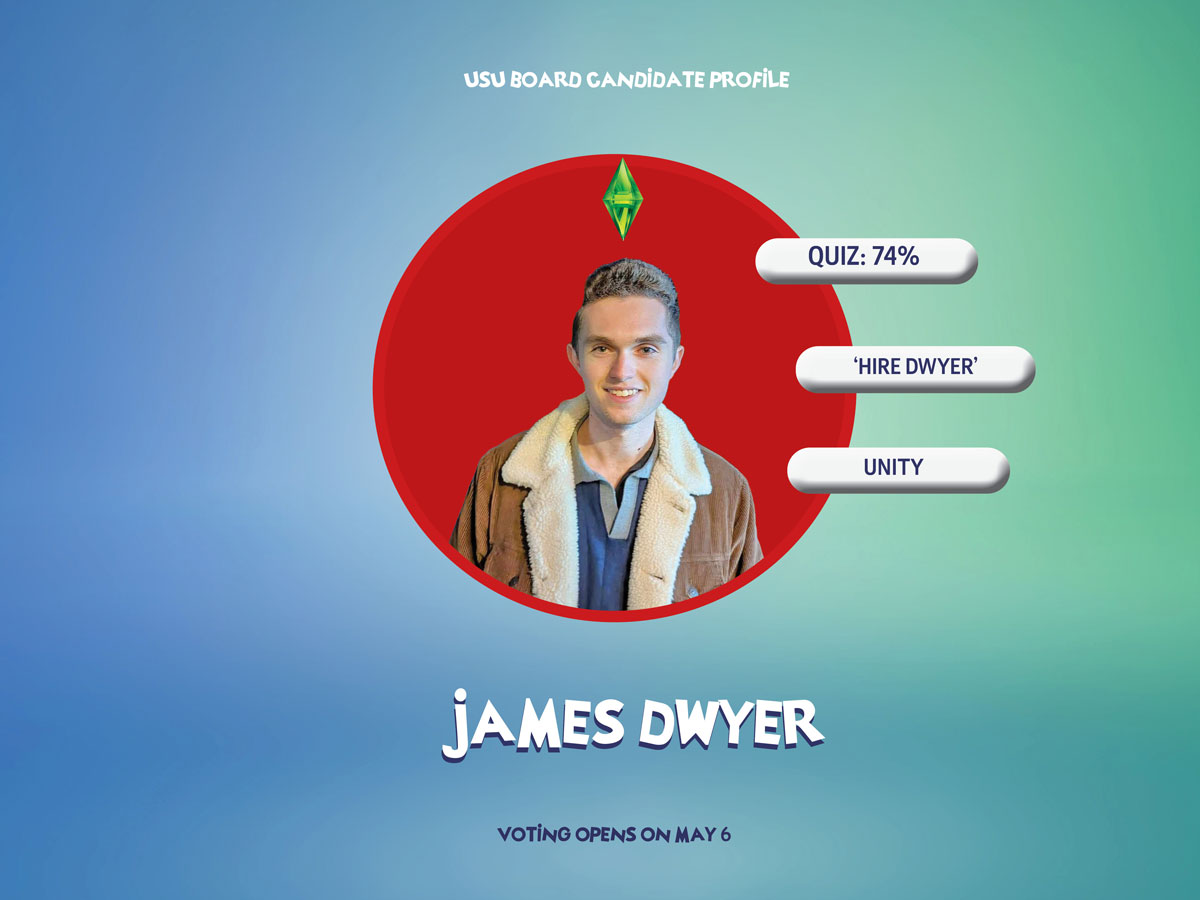Slogan: Hire Dwyer
Colour: Red
Faction: Unity
Degree: Comsci/Com IV
Quiz Score: 74%
James Dwyer is a confident candidate, clearly abreast of the inner-workings of the USU; this is reflected in his quiz score of 74%. Although running with backing from Student Unity, his focus on service provision derives from his wealth of experience working at the USU.
Dwyer’s policies aim to empower students; explaining his plans to increase club funding, he argued that, “students make the best decisions [for themselves], not corporations”. He envisions a better USU as one with better-funded clubs. This addresses one, but not all of the barriers clubs face in cultivating campus life. He also idealises a more democratic USU where more students are involved in making representations; this dovetails with his policy seeking more transparency. When asked to elucidate on buzzwords such as ‘democracy’ and ‘transparency’, Dwyer captured the current issues plaguing the USU; for example, that most USU members do not have close access to board directors.
One of Dwyer’s strongest policies is his funding strategies for club safety and anti-sexual assault and sexual harassment (SASH) training. He outlined plans to provide opt-in grants to subsidise security presence and anti-drink spiking tools at events, alongside the expansion of compulsory training. Importantly, Dwyer clarified that he wants to shift from online training to in-person sessions to ensure engagement, addressing common criticisms of USU training.
Dwyer’s policies also focus on building an international student community, showcasing sufficient knowledge of reasons underpinning this disconnect: he concedes that there are many ethnocultural events already, but international students are “not brought together in the best ways”. To resolve this, he proposes a generalised international student buddy program (as opposed to the current buddy program that caters to language exchange), and providing or refurbishing more spaces for international students, such as the international student lounge.
Considering this main policy push of a buddy program, the question arises as to how this will be staffed; Dwyer’s plan to source student volunteers potentially inflames existing criticisms of the USU for relying too heavily on unpaid student labour from the V-Team. Dwyer was not certain how to resolve this and acknowledged how this exacerbates cost-of-living pressures; however, he suggested solutions such as providing rewards. Whether this is sufficient is unclear.
Like many other candidates, Dwyer identified the cost of living crisis as a significant issue facing students that the USU must contend with. He believes that politics are an “integral part of being a student union”, but that the “USU should target its activist potential toward service provision and the cost of living.” Dwyer also envisioned Foodhub’s expansion, suggesting the USU hires a second paid worker and provides material goods.
Dwyer’s, like some candidates, also advocated the USU review their current partnerships to make sure money was going to organisations that aligned with students vaules. When asked for examples of what would count as unethical, Dwyer pointed to fossil fuel investments as well as lax vetting policies allowing a band with alleged ne-nazi connections to get a gig at Manning last year.
When pressed he has any policies that would increase the revenue of the USU after divestments were taken into account. Dwyer argued that the union could fight for more contestable SSAF funding and he would support a broader budgetary review to scrutinize current spending. Dwyer was confident that the USU could pivot to investments that remained profitable while being ethical but acknowledged that those decisions should be made on a case-by-case basis.
Overall, Dwyer is an experienced and highly competent voice for students. While not as much of an activist as more left-wing factions, his detailed policy platform and understanding of the USU’s operations make him one of the candidates to beat





